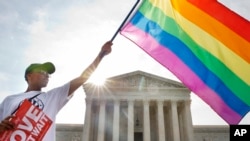The attorney general in the southern U.S. state of Texas says county clerks and judges do not have to issue marriage licenses or perform weddings if they have religious objections, following a U.S. Supreme Court ruling last week recognizing the right of same-sex couples to get married anywhere in the country.
In a letter Sunday to Lieutenant Governor Dan Patrick, Attorney General Ken Paxton said the high court's 5-4 decision did not overrule Constitutional "rights of religious liberty."
"This newly minted federal constitutional right to same-sex marriage can and should peaceably coexist with longstanding constitutional and statutory rights, including the rights to free exercise of religion and freedom of speech," Paxton said.
He wrote that clerks responsible for issuing marriage licenses are free to delegate to assistants rather than be forced to violate their own religious beliefs. Similarly, judges and justices of the peace should not be required to conduct same-sex weddings, Paxton said, because there are others, including priests, rabbis and other officials, who are legally allowed to officiate the ceremonies.
"So long as other authorized are willing to conduct same-sex wedding ceremonies, these statutory provisions demonstrate the practical reality that a refusal by a religiously objecting justice of the peace or judge cannot prevent a same-sex couple from participating in a wedding ceremony contemplated by state law," Paxton said.
The Supreme Court ruled Friday that the Constitution's rights to due process and equal protection overrule attempts by individual states to outlaw same-sex marriages.




